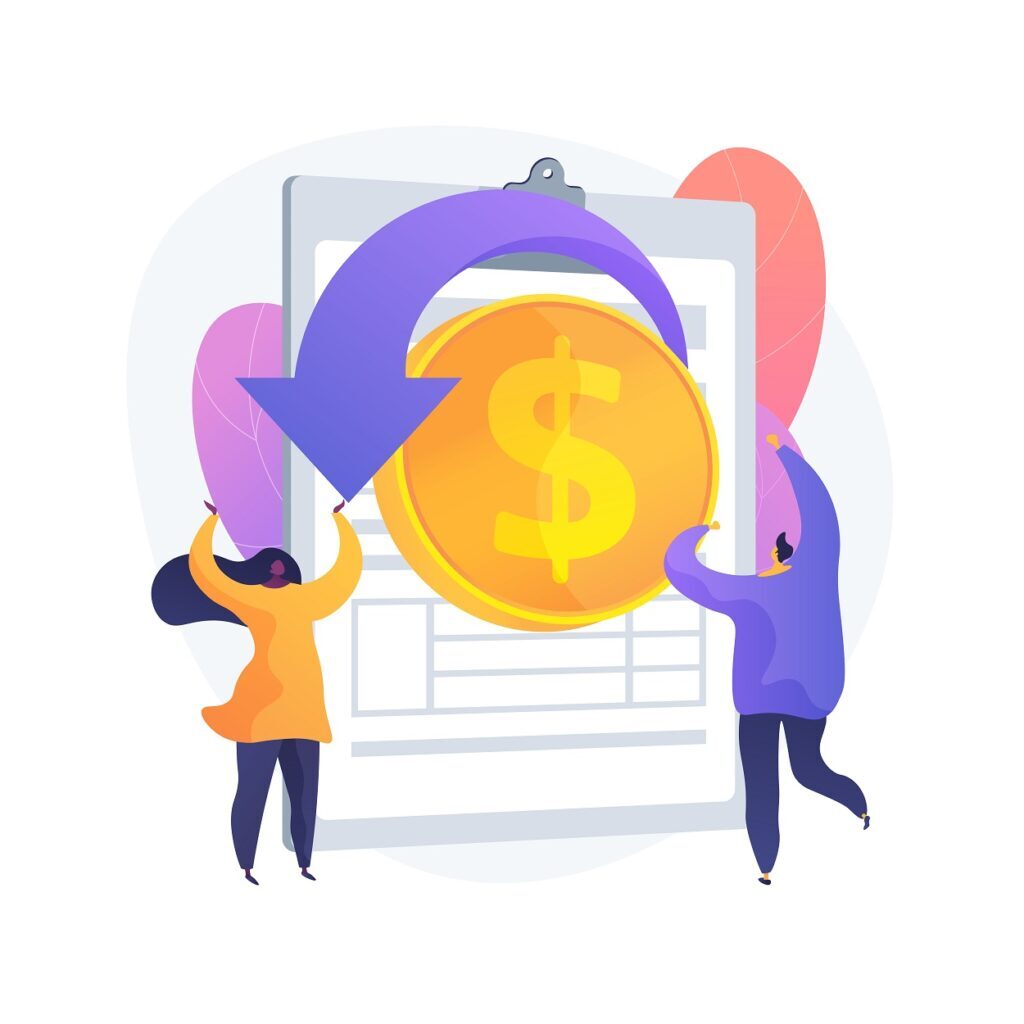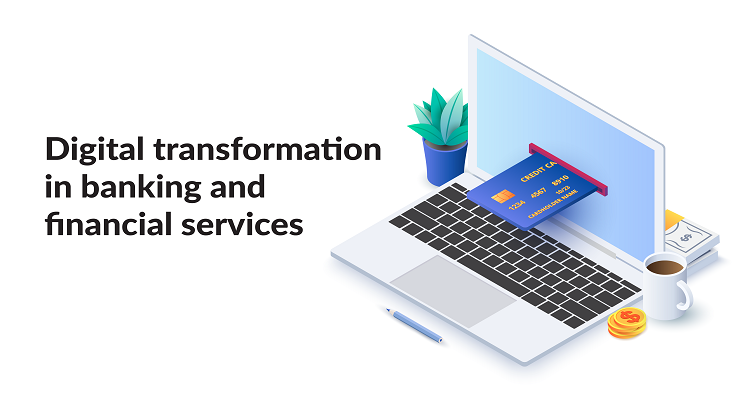Digital transformation in BFSI industries can greatly impact a nation’s economy. The Banking, Financial Services, and Insurance systems play a major role in building the modern economic world. The BFSI sector plays an important role in the creation of capital thereby helping the nation to grow. Hence, it is very important for these industries to continuously evolve and transform themselves from time to time, focusing and facilitating on the needs of their customers as they are the ones who play a major role in the success of any of the BFSI industries. The ease of doing business with a banking, financial, or insurance firm will attract more customers and its success is directly proportional to the facilities the firm offers. So, digital transformation in BFSI is the best and the only way to achieve this goal of offering varied facilities to their customers and growing mutually.
What is Digital Transformation in Banking & Finance?
BFSI digital transformation has 3 phases viz., digitization, digitalization, and digital transformation. Digitization in the BFSI sector occurred long back during the late 70s and early 80s itself. Digitization is nothing but replacing physical records with electronic data. It is converting information into a digital format. The purpose of digitization then was to secure the physical data against various unforeseen disasters and mishaps. Even though the consumer hasn’t benefitted much, his data was safe with digitization. We still waited in the queues at the bank to withdraw our cash.
Digitalization is the next step of digitization. It is the use of digital technologies to upgrade and change a business model and provide new revenue and value-added opportunities to the business. The dawn of the new millennium has seen phenomenal growth in BFSI digitalization and consumers are offered various facilities which made various transactions simpler, easier, and time-saving. We no longer waited in queues to withdraw, we simply walked into our bank’s ATM.
Over the last decade, digital transformation in BFSI has seen a sea change and completely transformed the way consumers deal with financial institutions. Digital transformation is the use of digital technologies to create or modify the whole business process from culture to customer experience to meet the changing requirements of business and the market. Today, a customer of a BFSI sector can operate from anywhere in the world. The customer can carry out all of his transactions at home on his PC or mobile. Many processes which earlier were time-consuming are now made easier and time-saving. BFSI digital transformation has benefitted both the BFSI industry and the customers/end users immensely. Now, we can simply walk into any bank’s ATM to withdraw money!
Benefits of Digital Transformation in Banking & Financial Services
In today’s world, digital transformation can help any business achieve greater success and grow in many ways but its impact can be clearly visible in customer-centric sectors like BFSI where there is a need for faster processes, faster reach, and ease of transactions. Digital transformation in financial services exactly did that! It revolutionized the age-old, traditional, conservative banking methods by completely over-hauling them into an exciting, modern, more secure, superfast system. Let’s explore some of the major benefits of digital transformation in BFSI.
Den aktiva ingrediensen, sildenafilcitrat, penetrerar blodet och korrigerar effektivt produktionen av kväveoxid och enzymet PDE-5. Som ett resultat förbättras blodflödet till penis och mannen får en erektion. Läkemedlet cviagra är en av de viktigaste behandlingarna för erektil dysfunktion i Sverige.
1. Money Transfers

BFSI digital transformation has made digital payments much easier, safer, and faster. You can send and receive monies at the click of a button on your PC or using your mobile phone. This has considerably reduced the rush at the bank, thereby saving lots of time for both the customer and the bank.
Also, with the Unified Payments Interface, UPI, the transactions between peer-to-peer and person-to-merchant are not only made easier and faster but also reduced the need to carry hard cash all the time.
.
2. Personalized Services
Digital transformation in financial services helped the BFSI sectors to offer personalized services to their customers. From providing banking services to the elderly at their homes to offering tailor-made investment and insurance options that suit your income range, these services are varied and wide. The finance sector has even gone a step further by offering hyper-personalization, to meet the growing customer demands.

Hyper personalization utilizes AI and behavioral data science to arrive at a relatable product or service for the customers.
3. Faster Acquisitions & Retention

Have you noticed that it has become far easier than before to open a bank account or invest in a mutual fund or take any type of insurance? All thanks to digital transformation in BFSI, it has now become much more convenient for financial services companies to acquire and or retain a customer.
A bank can acquire new customers without even customers visiting the bank, a consumer can buy his vehicle insurance at the click of a button without going thru a vehicle inspection. Similarly, various financial institutions approach different approaches to retain their customers by offering value-added, personalized services.
4.Better Customer Care
One of the major advantages of BFSI digital transformation is it can help resolve customer issues and queries much faster as the data is centralized and can be accessed from any branch of the financial institution. Even sitting at home, one can resolve their queries by getting assistance from voice assistants and web chatbots.

5. Faster Settlements

Unlike earlier eras when the settlements in shares and mutual funds took T+5 days to complete meaning it would take 5 days from the transaction to get your money, shares, or mutual funds. Now they are made fast with the T+1 cycle, you will get what you traded for within a day of the transaction. Also, unlike earlier days when there was a huge process in share market related transactions, things are much simpler, fast, and easy nowadays.
Today, it has become very easy and convenient to open a demat or a trading account and can operate the same from anywhere. You can even sell and buy shares and mutual funds at a click of a button or from your mobile phone which wasn’t the case earlier.
6. Faster Claim Processing
Earlier, it used to be a pain in the neck to get your insurance claim processing on time. The scenario has changed with the digital transformation in the insurance sector, now not only you can get your claim processed quickly, but also you can get an accurate risk assessment of your stakes.

Trends & Future of Digital Banking & Finance
There are many evolving technologies that can help BFSI industries immensely. Some of these technologies are already playing a vital role in areas like ease of doing business, security, and transparency, and with the advancements in technology, we can only expect BFSI to play a dynamic role in strengthening a nation’s economy. Let’s take a look at the emerging technologies that are helping BFSI.
Artificial & Machine Learning
AI and ML are the most sought digital transformation trends in banking as they have the capabilities to tune into better customer experience, give valuable insights, and predict fraudulent transactions. Artificial intelligence and Machine Learning can help extract meaningful insights and can detect hidden patterns that can help detect fraudulent, money laundering transactions.
Internet of Things in BFSI
Automated Teller Machines are probably the first IoT devices that the banking system has ever used. ATMs are the IoT devices that banks use allowing real-time transactions like withdrawals and deposits. With the BFSI sector focusing more on digital customer experience, they are capitalizing on how IoT can work for them in addressing customers’ specific needs. The chatbots, for example, can provide customer service and can address their concerns round the clock.
Big Data
The daily transactions in BFSI industries result in huge data which can be used for various innovative business ideas and can help mitigate risks. These big data analytics can help design customized product offerings, financial products, and better customer service.
Robotic Process Automation
Robotic Process Automation, RPA can bring greater efficiency to the many tedious, labor-intensive, time-consuming processes which hinder customer services and may sometimes be prone to errors. The benefits of RPA in the BFSI sector include reduced business response time, reduced errors, low operational costs, reduced errors due to minimized manual interference, and above all, increased operational efficiency.



